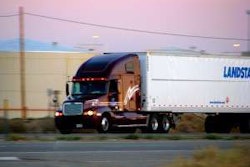The Coalition for Transportation Productivity, a group of 200 shippers and allied associations supporting higher federal vehicle weight limits on interstate highways, on Thursday, Feb. 2, expressed disappointment in a decision by the U.S. House Committee on Transportation and Infrastructure to commit further study to a truck weight reform proposal that had been included in the transportation reauthorization bill. The truck weight reform measure was part of a broader section of truck productivity measures that the Transportation Committee decided to include in a three-year study.
The specific proposal would allow states to opt into a higher federal vehicle weight limit for single-trailer trucks equipped with six axles rather than the typical five. The required sixth axle would maintain all braking and handling characteristics for the new limit of 97,000 pounds as the current 80,000-pound federal weight limit. The proposal is intended to help reduce the truckloads, vehicle miles and fuel necessary to meet demand.
A bipartisan amendment to require a study of the impact of heavier truck weight limits was approved Thursday, Feb. 2, as debate opened on the $260 billion American Energy and Infrastructure Jobs Act (H.R. 7). The amendment by Reps. Lou Barletta (R-Pa.) and Jerry Costello (D-Ill.) passed on a 33-20 vote.
“It really is ‘Groundhog Day’ today because this very committee asked the Transportation Research Board to study this same issue back in 1998, and the board strongly endorsed truck weight reform in its Special Report 267, issued in 2002,” said John Runyan, CTP executive director. “There is no need to commit further study to this truck weight proposal. Voluminous academic research and practical on-the-ground experience has proven that states should have the option to put more productive six-axle trucks on interstates. It is a safe and effective way to boost highway efficiency and productivity without increasing truck size or making trucks bigger in any way.”
The truck weight proposal that was contained in the American Energy and Infrastructure Jobs Act is based on federal legislation known as the Safe and Efficient Transportation Act (SETA). The bill first was introduced in the U.S. House of Representatives by Reps. Michael Michaud (D-Maine) and Jean Schmidt (R-Ohio) as H.R. 763. Identical companion legislation, S. 747, was introduced in the U.S. Senate by Sens. Mike Crapo (R-Idaho), Herb Kohl (D-Wis.), Susan Collins (R-Maine) and Rob Portman (R-Ohio).
“While we are very disappointed in the outcome, our effort is far from over,” said Runyan. “In less than three years, CTP has grown into a strong national organization with more than 200 members committed to truck weight reform. We intend to redouble our efforts and move forward. We will be working with members of Congress to introduce a significant amendment during consideration of the Highway Bill on the house floor.”










